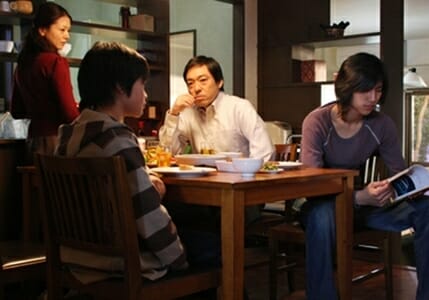
Tokyo! – 80
Tokyo Sonata – 85
Tokyo!
Release Date: March 6
Directors/Writers: Michel Gondry, Leos Carax, Bong Joon-Ho
Cinematographers: Masami Inomoto, Caroline Champetier, Jun Fukomoto
Starring: Ayako Fujitani, Ryo Kase, Denis Lavant, Teruyuki Kagawa
Studio/Run Time: Liberation Entertainment, 112 mins.
Tokyo Sonata
Release Date: March 13
Director: Kiyoshi Kurosawa
Writers: Max Mannix, Kiyoshi Kurosawa, Sachiko Tanaka
Cinematographer: Akiko Ashiza
Starring: Teruyuki Kagawa, Kyoko Koizumi, Yu Koyanagi
Studio/Run Time: Regent Releasing, 119 mins.
Tokyo! and Tokyo Sonata, two films by four directors containing six narratives, propose the Japanese megalopolis as a site for major weirdness. A girl turns into a chair. A man drives a car from the beach into the ocean. A zombie in a green suit climbs from the sewers and wreaks havoc.
Tokyo! is comprised of three short pieces directed by Michel Gondry, Leos Carax, and Bong Joon-Ho respectively—two Frenchmen and a South Korean. All offer semi-magical outsiders’ perceptions of the city. After Be Kind Rewind, his questionable foray into broad comedy, Gondry displays his semi-familiar misogyny in his “Interior Design” segment. But one character’s Ovid-like transformation into a chair, literally supporting a man, is a logical articulation of the bizarre sexual tension explored in Science of Sleep.
Chance encounters and unexpected violence—like byproducts of a teeming energy beneath the grid—spin the characters toward revelation. With each left turn, and three equally compelling performances, Kurosawa brings the film closer to a harmonic resolution, if not an emotional one.